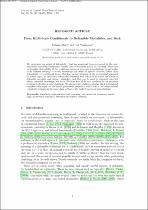JavaScript is disabled for your browser. Some features of this site may not work without it.
- ResearchSpace
- →
- Research Publications/Outputs
- →
- Journal Articles
- →
- View Item
| dc.contributor.author |
Britz, K

|
|
| dc.contributor.author |
Varzinczak, I

|
|
| dc.date.accessioned | 2019-03-07T12:12:58Z | |
| dc.date.available | 2019-03-07T12:12:58Z | |
| dc.date.issued | 2018-03 | |
| dc.identifier.citation | Britz, K. and Varzinczak, I. 2018. From KLM-style conditionals to defeasible modalities, and back. Journal of Applied Non-Classical Logics, vol. 28(1): 92-121 | en_US |
| dc.identifier.issn | 1166-3081 | |
| dc.identifier.issn | 1958-5780 | |
| dc.identifier.uri | https://www.tandfonline.com/doi/full/10.1080/11663081.2017.1397325 | |
| dc.identifier.uri | https://doi.org/10.1080/11663081.2017.1397325 | |
| dc.identifier.uri | http://hdl.handle.net/10204/10755 | |
| dc.description | Copyright: 2018 Taylor & Francis. Due to copyright restrictions, the attached PDF file contains the postprint version of the published item. For access to the published version, kindly consult the publisher's website: https://www.tandfonline.com/doi/full/10.1080/11663081.2017.1397325 | en_US |
| dc.description.abstract | We investigate an aspect of defeasibility that has somewhat been overlooked by the nonmonotonic reasoning community, namely that of defeasible modes of reasoning. These aim to formalise defeasibility of the traditional notion of necessity in modal logic, in particular of its different readings as action, knowledge and others in specific contexts, rather than defeasibility of conditional forms. Building on an extension of the preferential approach to modal logics, we introduce new modal operators with which to formalise the notion of defeasible necessity and distinct possibility, and that can be used to represent expected effects, refutable knowledge, and so on. We show how KLM-style conditionals can smoothly be integrated with our richer language. We also propose a tableau calculus which is sound and complete with respect to our modal preferential semantics, and of which the computational complexity remains in the same class as that of the underlying classical modal logic. | en_US |
| dc.language.iso | en | en_US |
| dc.publisher | Taylor & Francis | en_US |
| dc.relation.ispartofseries | Worklist;22098 | |
| dc.subject | Knowledge representation and reasoning | en_US |
| dc.subject | Non-monotonic reasoning | en_US |
| dc.subject | Modal logic | en_US |
| dc.subject | Preferential semantics | en_US |
| dc.subject | Defeasible modalities | en_US |
| dc.subject | Tableaux | en_US |
| dc.title | From KLM-style conditionals to defeasible modalities, and back | en_US |
| dc.type | Article | en_US |
| dc.identifier.apacitation | Britz, K., & Varzinczak, I. (2018). From KLM-style conditionals to defeasible modalities, and back. http://hdl.handle.net/10204/10755 | en_ZA |
| dc.identifier.chicagocitation | Britz, K, and I Varzinczak "From KLM-style conditionals to defeasible modalities, and back." (2018) http://hdl.handle.net/10204/10755 | en_ZA |
| dc.identifier.vancouvercitation | Britz K, Varzinczak I. From KLM-style conditionals to defeasible modalities, and back. 2018; http://hdl.handle.net/10204/10755. | en_ZA |
| dc.identifier.ris | TY - Article AU - Britz, K AU - Varzinczak, I AB - We investigate an aspect of defeasibility that has somewhat been overlooked by the nonmonotonic reasoning community, namely that of defeasible modes of reasoning. These aim to formalise defeasibility of the traditional notion of necessity in modal logic, in particular of its different readings as action, knowledge and others in specific contexts, rather than defeasibility of conditional forms. Building on an extension of the preferential approach to modal logics, we introduce new modal operators with which to formalise the notion of defeasible necessity and distinct possibility, and that can be used to represent expected effects, refutable knowledge, and so on. We show how KLM-style conditionals can smoothly be integrated with our richer language. We also propose a tableau calculus which is sound and complete with respect to our modal preferential semantics, and of which the computational complexity remains in the same class as that of the underlying classical modal logic. DA - 2018-03 DB - ResearchSpace DP - CSIR KW - Knowledge representation and reasoning KW - Non-monotonic reasoning KW - Modal logic KW - Preferential semantics KW - Defeasible modalities KW - Tableaux LK - https://researchspace.csir.co.za PY - 2018 SM - 1166-3081 SM - 1958-5780 T1 - From KLM-style conditionals to defeasible modalities, and back TI - From KLM-style conditionals to defeasible modalities, and back UR - http://hdl.handle.net/10204/10755 ER - | en_ZA |






